
Does a raw food diet help dog skin allergies?

Dr Scott Miller
28 March 2022 | 6 minutes read
Have raw food adverts for dogs been catching your eye recently? The diet promises lots of health benefits for your pooch, including helping with skin allergies. But how true are these claims? Dr Scott Miller is here to debunk the mysteries of this increasingly popular canine diet.
- What is a dog raw food diet?
> What are the suggested benefits of a dog raw food diet? - What’s the scientific research behind dog raw food diets?
- Does a raw diet help dogs with skin allergies?
> Why are vets against a raw diet for dogs?
> Can dogs get e. coli or worms from eating raw meat?
> Can dogs choke on raw bones? - What food is best for dogs with itchy skin or skin allergies?
> What are other dog skin allergy treatments?
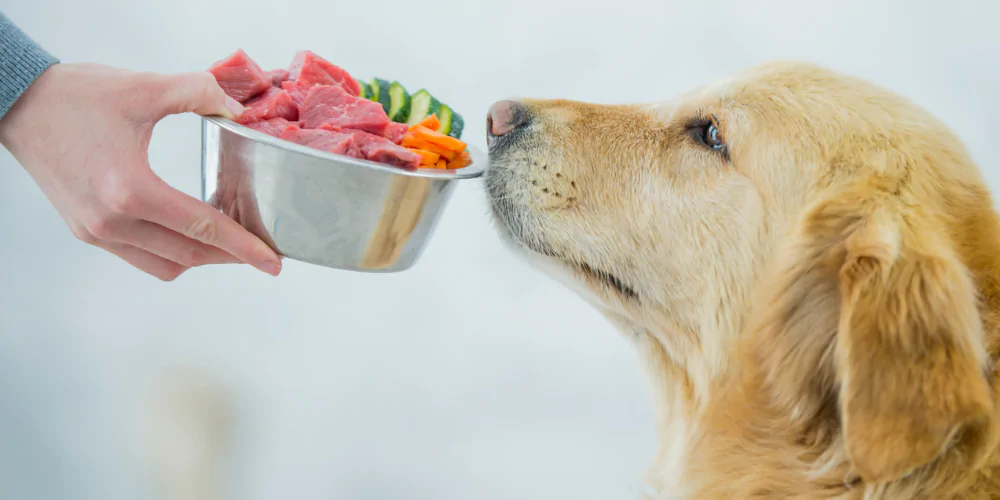
What is a dog raw food diet?
A raw food diet (or raw feeding) is exactly as it sounds. Instead of cooked or processed foods, you give your dog raw ingredients for their meals and treats.
A raw food diet for dogs could include a mix of:
- Fresh fruit
- Fresh veggies
- Whole/ground bones
- Animal muscle meat
- Animal organs
- Raw eggs
Many dog (and cat) owners who raw feed think it’s the more natural and healthy choice, mirroring what dogs would eat in the wild.
> What are the suggested benefits of a dog raw food diet?
Companies like Raw Dog Food Cornwall claim raw food diets help your pet by:
- Helping skin allergies
- Giving them a healthier or shinier coat
- Improving the quality of their stool
Some companies argue that cooked commercial pet foods are too processed, not giving enough or the right kind of nutrition. Others even say that these processed meals could even cause your pet chronic health issues.
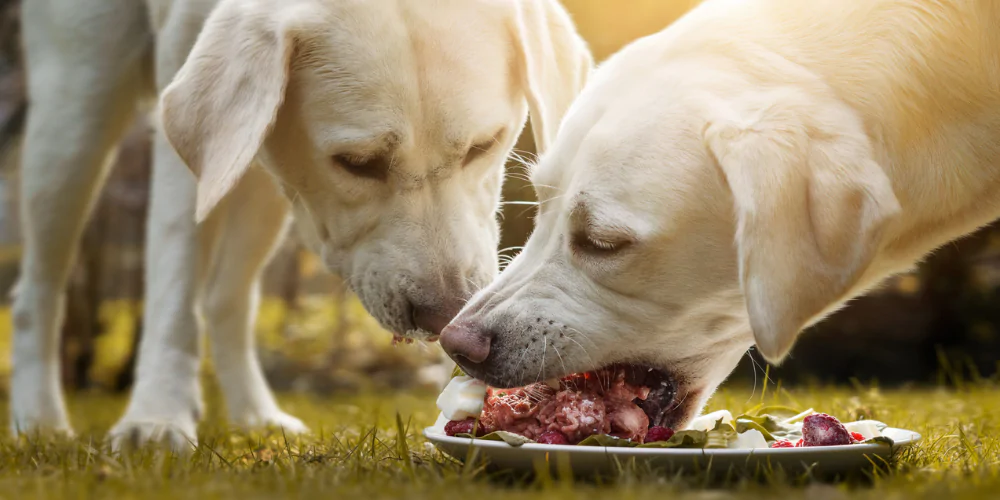
What’s the scientific research behind dog raw food diets?
The University of Helsinki published a study in 2021 on how a puppy’s diet affected skin allergy symptoms in adult life. The study gave dog owners an online feeding survey about their puppies’ diets from two to six months of age.
The study found:
- Puppies with a diet of least 20% raw food saw a large drop in allergy and atrophy related skin symptoms as adults.
- Puppies who had no raw food at all saw a big lift in these skin conditions as they got older.
- Puppies with a diet of 20% processed commercial foods (like canned or sausage packed) also saw a big increase in these skin symptoms in adulthood.
- A suggested link between more fresh food (plus less processed food/sweet fruits) and a lower risk of skin allergies and conditions.
- More studies are needed to look at how other foods and oils could affect skin conditions in dogs.
What’s important to remember is these findings only suggest – rather than prove – a dog raw food diet could be positive for your pooch. It’s really down to individual experiences than widely-proven results.
This is only one review with a relatively low number of case studies, meaning it’s hard to be guided by the findings. There’s also not a lot of other published research articles out there on raw feeding.
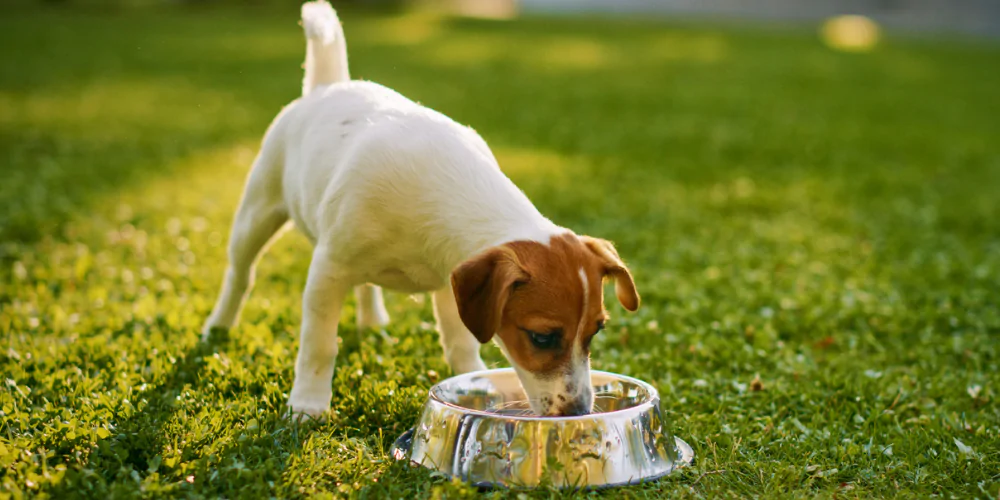
Does a raw diet help dogs with skin allergies?
So, could a raw diet really help to relieve your dog’s skin allergies? It depends. If your dog is having skin problems, the safest option is to speak to your vet before switching to raw feeding.
While some pooches could see their skin improve by eating raw food, swapping to this type of diet could lead to other health problems.

> Why are vets against a raw diet for dogs?
Many vets don’t recommend giving your dog or cat a raw food diet as:
- There’s lots of recorded risks on pet raw food diets, but not as many clear benefits.
- Raw foods can carry parasites and bacteria that may be risky for your pet.
- Prepping raw food for your pet could lead to bacteria cross-contamination with members of your family, making them ill.
- It may give them too much or too little of certain nutrients – domestic dogs have different dietary needs to their ‘wild’ counterparts.
- Transporting and storing raw food while in transit could expose them to e. Coli and salmonella. These could cause gastrointestinal upset and even more serious illnesses.

> Can dogs get e. coli or worms from eating raw meat?
It’s possible that your pup could get e. coli or worms from eating raw meat. Low quality or cheaper meat cuts (such as from a supermarket) aren’t prepared in a hygienic way to safely eat raw.
Healthy adult dogs might be able to resist a lot of the organisms, but it doesn’t make them completely safe from infected raw foods. Immunosuppressed dogs, puppies, and senior canines are even more at risk of getting poorly.
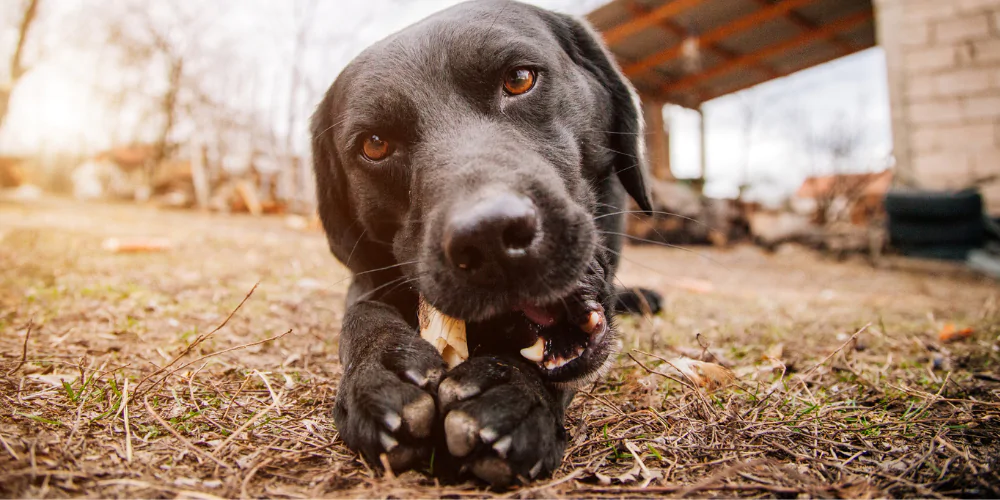
> Can dogs choke on raw bones?
Dogs can choke on raw bones, especially if they’re already small or chewed down into smaller pieces. In most raw foods, the bones are ground up to stop worries about choking. But there’s other potential problems with eating raw bones as part of a raw food diet, like:
- Breaking their teeth
- Hurting their mouth and tongue
- Injuring their stomach and intestinal lining
- Getting blockages in their stomach or small intestine
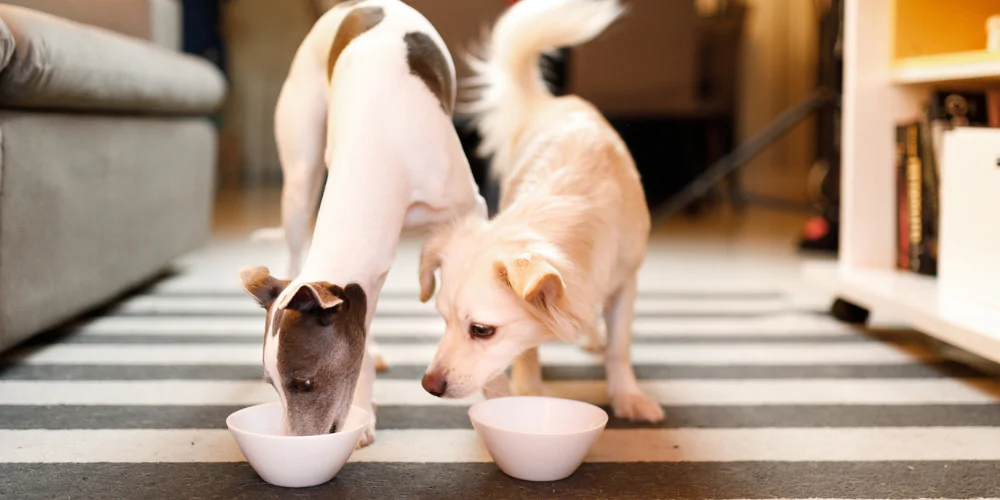
What food is best for dogs with itchy skin or skin allergies?
Helping your dog’s skin allergies comes down to their individual needs – there’s no one-size-suits-all diet. Your vet can suggest a food plan or food exclusion trial to find the specific cause of the food allergy or intolerance. This will also help make sure your pet gets the nutrition they need for their age, breed, size, and any medical issues.
> What are other dog skin allergy treatments?
Aside from looking at their diet, vets can help your dog with skin allergy flare-ups by suggesting things like:
- Antihistamines
- Immunomodulatory drugs
- Steroid tablets/sprays
- Regular external parasite control (such as flea and tick prevention)
- Keeping them indoors on high pollen count days (in case of contact or environmental allergy)
- Regularly dusting the house
- Supplements and shampoos
- Special shampoos
If you have a Petsure policy and want extra support on helping your dog’s skin allergies, reach out to FirstVet. With unlimited 24/7 access to video chats with a UK-registered vet, you can get advice on treatments for your pooch.
When the unexpected happens to your pup, having Petsure dog insurance gives you peace of mind that you’re covered.


